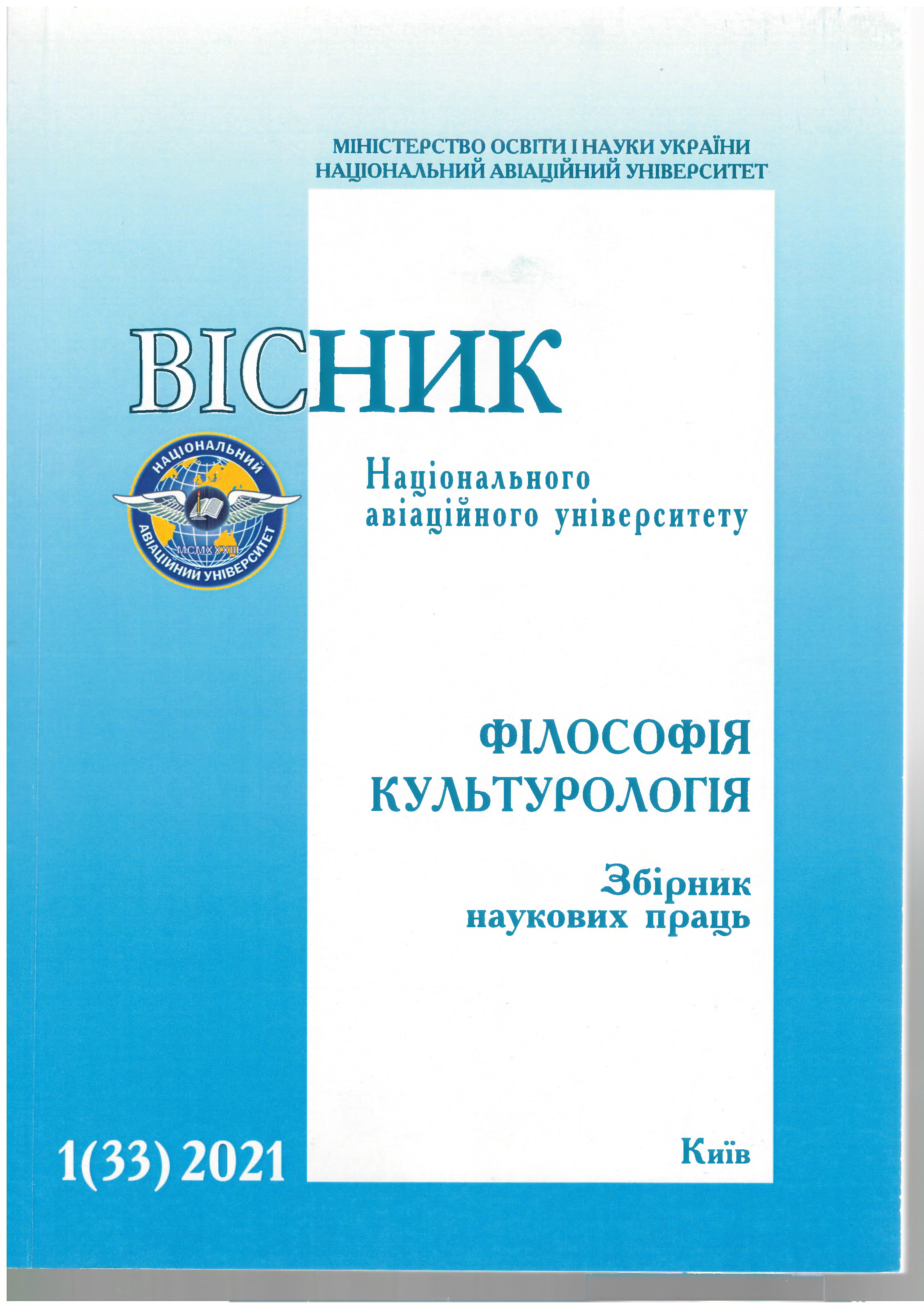URBAN IDENTITY: CULTURAL-PHILOSOPHICAL ANALYSIS
DOI:
https://doi.org/10.18372/2412-2157.33.15655Keywords:
urban identity, cultural code of the city, urban space, city culture, cultural environmentAbstract
Introduction. Examining the historical development of the city, we can see that, despite the seemingly all-encompassing nature of
the Christian worldview, its social norms and standards are clearly manifested only in the urban environment. The aim and tasks
are a cultural-philosophical study of the concept of "urban identity" and its relationship with the cultural code of the city. Research
methods. The article uses cultural and philosophical analysis, the principle of historicism and socio-cultural approach. Research
results. The city emerges as a unique social space in which an attempt is made to break the organic connection with natural
processes, which remained the main feature of rural life, determining the way of thinking and values of the rural population. Unlike
the rural man, who in eternal and inseparable connection with nature in his life is guid-ed by customary law, the rules of which are
based on the principle of "so it was from age", citizens, separating themselves from the field and nature by an unshakable wall,
create a republic. governed not by natural but by social laws. Discussion. The formation and historical development of urban
space largely determines the cultural values and motives of human behav-ior in society. However, the heterogeneity of this
process suggests the need to study the impact of urban space on the cul-tural identification of man in modern society. The very
process of human perception of any cultural tradition is associated with the definition of the environment and the stages of its
formation. Conclusion. Summarizing all above, we note that each city has its own identity and semantics, which were formed
throughout the historical development of the city itself. They concentrate all culture, from architectural monuments, theaters,
museums, theme parks, leisure facilities, and ending with modern art grounds, innovative works of art. Each city has its own
traditions, its own coat of arms and even its own anthem. All this creates a unique code of the city, not inherent in any other city.
The interaction of this system of images as a whole leads to the formation of the image of the city.
References
Curtis B. That Place Where: Some Thoughts on Memory
and the City. The Unknown City [Eds. I. Borden, J.Kerr,
A. Pivaro].Cambridge, L. : The MIT Press, 2002. P. 54-68.
Бабаева А. В. Человек в городском культурном про-
странстве // Философия XX века: школы и концепции: Науч-
ная конференция к 60-летию философского факультета
СПбГУ, 21 ноября 2000 г. Материалы работы секции молодых
учёных «Философия и жизнь». Санкт-Петербург: Санкт-
Петербургское философское общество, 2001. – C. 26-28.
Вирт Л. Урбанизм как образ жизни / Л. Вирт. URL:
Зиммель Г. Большие города и духовная жизнь / Г. Зим-
мель Москва: Логос, 2002. – № 3-4. – С. 20-48.
Ильдарханова Ч. И. Переоткрытие социальной реаль-
ности города и села / Ч. И. Ильдарханова. Вестник МГИМО
Университета. 2014. – № 6 (39). – С. 228-235.
Карповець М. В. Місто як світ людського буття: філософсь-
ко-антропологічний аналіз : дис. ... канд. філос. наук : 09.00.04;
Київ. нац. ун-т ім. Тараса Шевченка. Київ, 2013. – 224 c.
Козловский В. П. Культурно-исторические традиции и
мировоззрение личности. Мировоззренческая культура лич-
ности (философские проблемы формирования). – Киев: Нау-
кова думка, 1986. – С. 245-292.
Кравченко О. І. Вплив інфраструктури на духовну куль-
туру міста в індустріальну епоху: філософський аналіз. Вісник
національного авіаційного університету. Серія: Філософія.
Культурологія: Збірник наукових праць. Вип. 1(23). – Київ:
НАУ, 2016. – С. 104-107.
Линч К. Образ города. Москва: Стройиздат, 1982. – 328 с.
Мусиездов А.А. Идентичность города: динамика обра-
за Харькова в исторической перспективе. Методологія, теорія
та практика соціологічного аналізу сучасного суспільства. –
– №15. – С. 488-494.
Ортега-и-Гассет Х. Восстание масс. Дегуманизация искус-
ства. Бесхребетная Испания. Москва: АСТ: СТ Москва, 2008. – 347 с.
Платон Федр. URL: http://psylib.org.ua/books/plato01
/21fedr.htm
Сухушина Е. В., Рыкун А. Ю., Погодаев, Н. П. Город-
ское пространство – опыт исследования. Вестник Томского
гос. универ. Философия. Социология. Политология. 2014.
Вып. 1 (25). – С. 84-98.
Тоффлер Э. Третья волна. Москва: ООО «Фирма
«Издательство АСТ», 2010. – 331 с.
Хайдеґґер М. Будувати, проживати, мислити «Ї», 1989.
№1. URL: http://www.ji.lviv.ua/n1texts/heid2.
Шютц А. Смысловая структура повседневного мира;
пер. с англ. А. Я. Алхасова, Н. Я. Мазлумяновой. Москва:
Институт Фонда «Общественное мнение», 2003. – 336 с.
Энгельс Ф. Большие города. Энгельс Ф. Положение
рабочего класса в Англии. URL: http://www.urbanclub.
ru/?p=202

